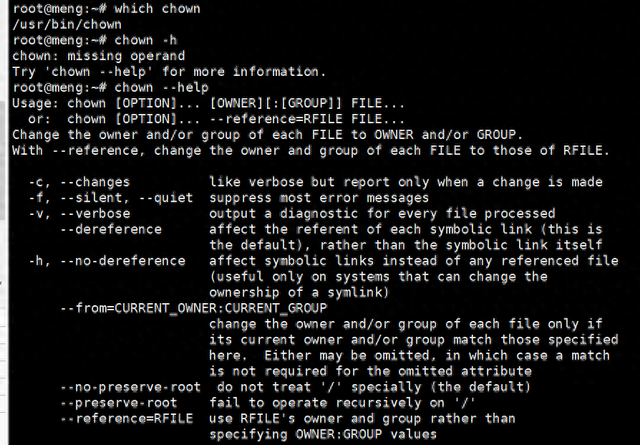linux 系统下 chown 命令介绍及案例使用
Linux 系统下 chown 命令用于更改文件和目录的所有者和所属组
chown 命令介绍基本语法:
bashchown [选项] 所有者[:组] 文件名所有者:指定新的文件所有者的用户名或 UID。组:指定新的文件所属组的组名或 GID。可选,如果不指定则保持不变。文件名:要改变所有权的文件或目录。常用选项:
-R:递归地改变目录及其子目录下的所有文件。-c:当更改所有权时,显示每个处理的文件的信息。-f:抑制大部分错误信息。-v:详细显示每个处理的文件的信息。命令:
root@meng:~# which chown
/usr/bin/chown
root@meng:~# chown -h
chown: missing operand
Try 'chown --help' for more information.
root@meng:~# chown --help
Usage: chown [OPTION]... [OWNER][:[GROUP]] FILE...
or: chown [OPTION]... --reference=RFILE FILE...
Change the owner and/or group of each FILE to OWNER and/or GROUP.
With --reference, change the owner and group of each FILE to those of RFILE.
-c, --changes like verbose but report only when a change is made
-f, --silent, --quiet suppress most error messages
-v, --verbose output a diagnostic for every file processed
--dereference affect the referent of each symbolic link (this is
the default), rather than the symbolic link itself
-h, --no-dereference affect symbolic links instead of any referenced file
(useful only on systems that can change the
ownership of a symlink)
--from=CURRENT_OWNER:CURRENT_GROUP
change the owner and/or group of each file only if
its current owner and/or group match those specified
here. Either may be omitted, in which case a match
is not required for the omitted attribute
--no-preserve-root do not treat '/' specially (the default)
--preserve-root fail to operate recursively on '/'
--reference=RFILE use RFILE's owner and group rather than
specifying OWNER:GROUP values
-R, --recursive operate on files and directories recursively
The following options modify how a hierarchy is traversed when the -R
option is also specified. If more than one is specified, only the final
one takes effect.
-H if a command line argument is a symbolic link
to a directory, traverse it
-L traverse every symbolic link to a directory
encountered
-P do not traverse any symbolic links (default)
--help display this help and exit
--version output version information and exit
Owner is unchanged if missing. Group is unchanged if missing, but changed
to login group if implied by a ':' following a symbolic OWNER.
OWNER and GROUP may be numeric as well as symbolic.
Examples:
chown root /u Change the owner of /u to "root".
chown root:staff /u Likewise, but also change its group to "staff".
chown -hR root /u Change the owner of /u and subfiles to "root".
GNU coreutils online help: <https://www.gnu.org/software/coreutils/>
Report any translation bugs to <https://translationproject.org/team/>
Full documentation <https://www.gnu.org/software/coreutils/chown>
or available locally via: info '(coreutils) chown invocation'

命令案例:
root@meng:~# ls -al meng.txt
-rwxr-xr--. 1 root meng 45 Aug 22 09:37 meng.txt
root@meng:~# chown meng meng.txt
root@meng:~# ls -al meng.txt
-rwxr-xr--. 1 meng meng 45 Aug 22 09:37 meng.txt
root@meng:~# chown -c meng meng.txt
root@meng:~# chown -v meng meng.txt
ownership of 'meng.txt' retained as meng
root@meng:~# ls -al meng.txt
-rwxr-xr--. 1 meng meng 45 Aug 22 09:37 meng.txt
root@meng:~# chown -v root.meng meng.txt
changed ownership of 'meng.txt' from meng:meng to root:meng
root@meng:~# ls -al meng.txt
-rwxr-xr--. 1 root meng 45 Aug 22 09:37 meng.txt
